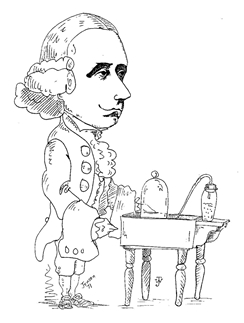Important Chemists in History: Joseph Priestley

"Gas"
Joseph Priestley (1733-1804). British chemist and Unitarian Minister. Priestley earned his living as a minister and teacher at various dissenting academies. His work in chemistry was done in his spare time and largely during the period when he served as private librarian to Lord Shelburne. It dealt almost exclusively with the use of the pneumatic trough to discover a large number of new "airs" or gases, including nitrogen oxide, nitrogen dioxide, dinitrogen oxide, ammonia, hydrogen chloride, sulfur dioxide and, most famously of all, oxygen (1774). He also investigated the processes of brewing, photosynthesis, respiration, and invented soda water. Priestley was a prolific writer, not only on chemistry, but also on the subjects of theology, history, geography, natural philosophy, and electricity. Due to
his liberal political opinions, his home and laboratory were destroyed by a Birmingham mob in 1791, and he spent his final years in Northumberland Pennsylvania, where he wrote several pamphlets defending the outdated phlogiston theory against Lavoisier's newer oxygen theory of combustion.
Courtesy of Professor William Jensen, Oesper Chair of the History of Chemistry and Chemical Education, University of Cincinnati